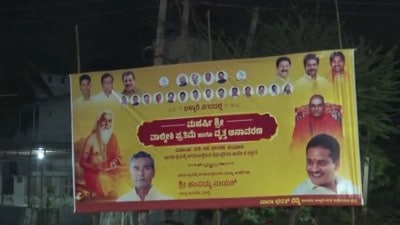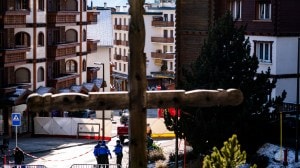The outsiders
If Indians want to understand Pakistan's Muttahida Qaumi Movement, or MQM, better, a parallel could be the Shiv Sena party in Mumbai. The ...

If Indians want to understand Pakistan8217;s Muttahida Qaumi Movement, or MQM, better, a parallel could be the Shiv Sena party in Mumbai. The MQM is led by a demi-god, the party is run by its mass support in the country8217;s largest city and its main port. It has fascist tendencies and uses strong-arm tactics to suppress whatever negligible opposition there is to it.
Like the Shiv Sena, the MQM can within hours bring Karachi to a grinding halt through its network or workers and sympathisers. On the political front, its alliances with national parties always end up in problems because of its hardline approach. Power is vested in one man while its ethnic and linguistic agenda ensures that it is voted into power in Karachi and some other cities of Sindh province with a thumping majority.
But if there8217;s one key difference with the Shiv Sena, it is that the MQM has been forced to stay out of power despite having the electoral mandate by extra-constitutional forces, particularly the army, in recent years. Observers say that while the army created the MQM, the movement has now turned against its creator.
The MQM claims to represent the Muhajirs. These are people, largely from what is now Uttar Pradesh, who migrated to Karachi to live in what they saw was a Muslim state. That dream didn8217;t last for long. In Pakistan8217;s feudalistic society, these middle class educated people were cast aside, ignored and discriminated against by the Punjabi community, which has held control of Pakistan ever since independence.
The discrimination has several faces. Government jobs were denied to them and a quota system introduced, which stipulated that they would get no more than 7 per cent of employment with the government for decades to come. Though over 70 per cent of the centre8217;s revenues come from Karachi, barely 5 per cent was allocated to the city for development, even lesser than Lahore or Islamabad.
These issues egged on Altaf Hussain, a former New York cabbie, to form the Muhajir Qaumi Movement the refugees8217; national movement. The MQM got its break in 1985, when the then president, General Zia, silently supported it to break the might of Benazir Bhutto8217;s Pakistan Peoples Party in the urban areas of Sindh province. By the time Zia was killed in a plane crash in 1988, the MQM had emerged as an unrivalled force in Karachi and other cities of Sindh, forcing the PPP to hold sway in the rural areas of the province.
In time, the MQM developed fascist tendencies with its unrivalled hold over Karachi. Altaf Hussain was referred to as 8220;Pir sahab8221; Mister Saint and the MQM brooked no opposition in its ranks. The brutality of its hit squads became legendary along with the growing might of Hussain himself. Within years of being elected, MQM committees8217; started collecting protection money from businessmen, and disputes began to be settled by MQM activists rather than the police. By 1990, the MQM had turned against its creator. Army officers, who were spying on the MQM, were picked up and tortured. Unheard of till then in Pakistan.
This prompted the army to start a crackdown on the movement. The army8217;s Karachi Operation8217; lasted for over three years, during which intelligence agencies tried to split the MQM and crush its leaders. Hussain had by then fled to London and set up base there. Since then, he has repeatedly stated that he fears for his life if he returns to Pakistan.
Human rights organisations report that the army committed widespread atrocities against the people of Karachi, irrespective of their affiliations with the MQM. In 1993, when Benazir Bhutto returned as prime minister, she strenghtened the army operation, which was then personally headed by her interior minister, Naseerullah Babar. Bhutto had her reasons. After the break-up of an accord with the MQM, her party later accused it of engineering the overthrow of her government in 1990. The resulting clashes between the MQM and government forces resulted in 2,000 deaths in 1995 alone.
While the death toll has since dropped, differences between the MQM and the army have only intensified. In the 1997 elections, the MQM won several seats and entered into an alliance with prime minister Nawaz Sharif. By 1998, this alliance had broken when Sharif came under increasing pressure from the army to address the deteriorating law and order situation in Karachi.
While the MQM changed its name to the Muttahida Qaumi Mahaz United National Front, its credentials as a party that fights for Muhajirs has ensured that it made little headway in other parts of the country.
In 1995, the MQM argued that the Pakistan government should pay more attention to killings in Karachi than atrocities in Kashmir. Predictably, the MQM was marginalised for its stance. Yet, as it continued to be targeted by intelligence agencies and the military, its leadership has decided to be more vocal about perceived injustices against Muhajirs.
Earlier this month, Hussain told the media that the two nation theory, which argues that Muslims and Hindus are two separate nations and is the basis of the creation of Pakistan, was a 8220;farce8221;. MQM representatives travelled to India and gave interviews to Indian television that were widely watched in Pakistan. The team also rejected the military government and called for undoing of Partition.
The Pakistan government is now finalising plans to charge Hussain and his party leaders with high treason. There8217;s also a possibility that the MQM will not be allowed to participate in the forthcoming local bodies elections in Pakistan.
If the MQM is forced to stay out of the local body polls, which it is expected to win hands down in Karachi, and other urban parts of Sindh province, the 8220;true democracy8221; that General Musharraf has promised to Pakistan will elude the country as a level playing field will not be allowed to some parties, as has been the case with the MQM in previous elections. This will reinforce the never-ending cycle of violence in Karachi as the MQM will resort to extra-constitutional ways to make its presence felt, as it has done before.
- 01
- 02
- 03
- 04
- 05































